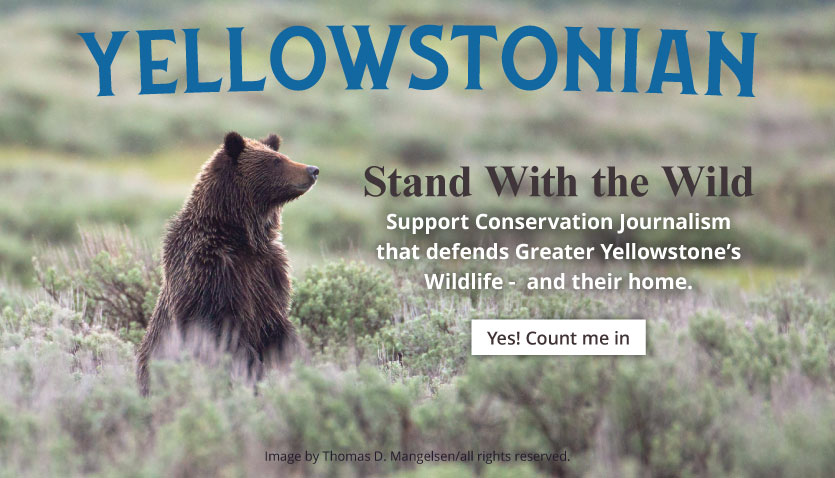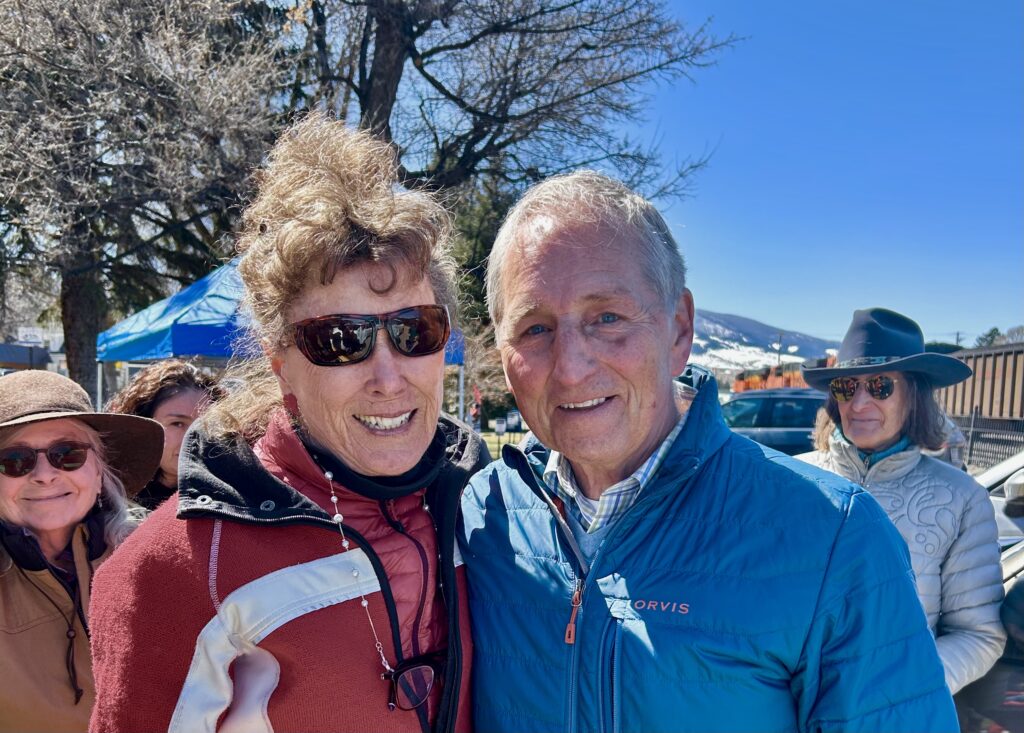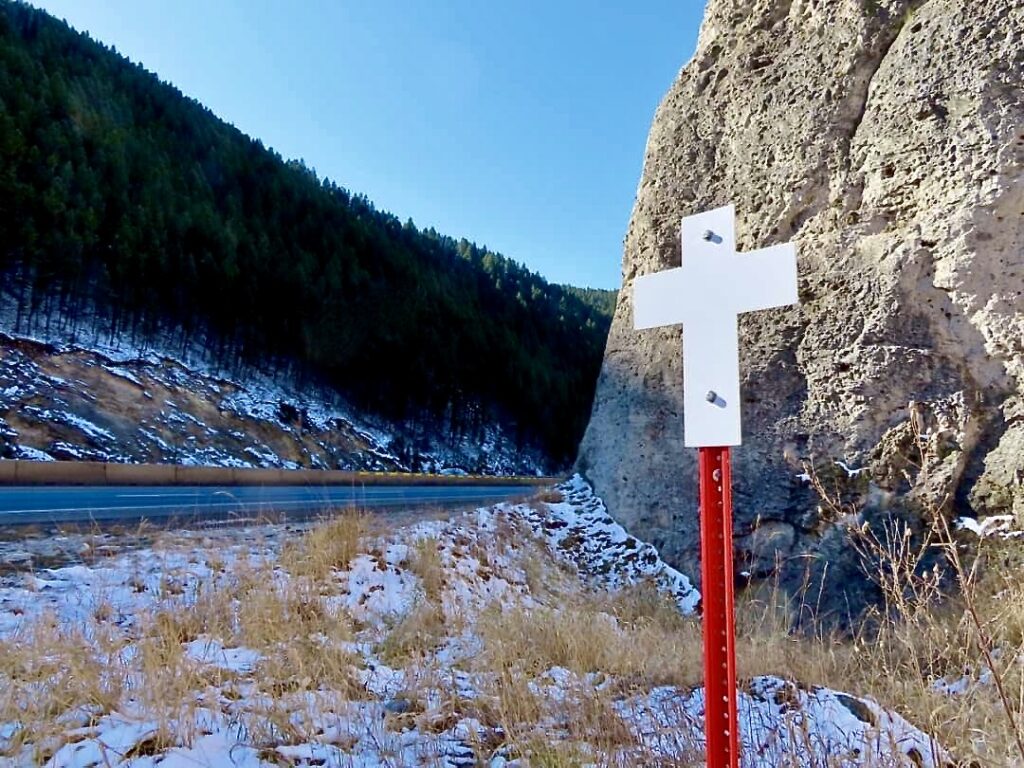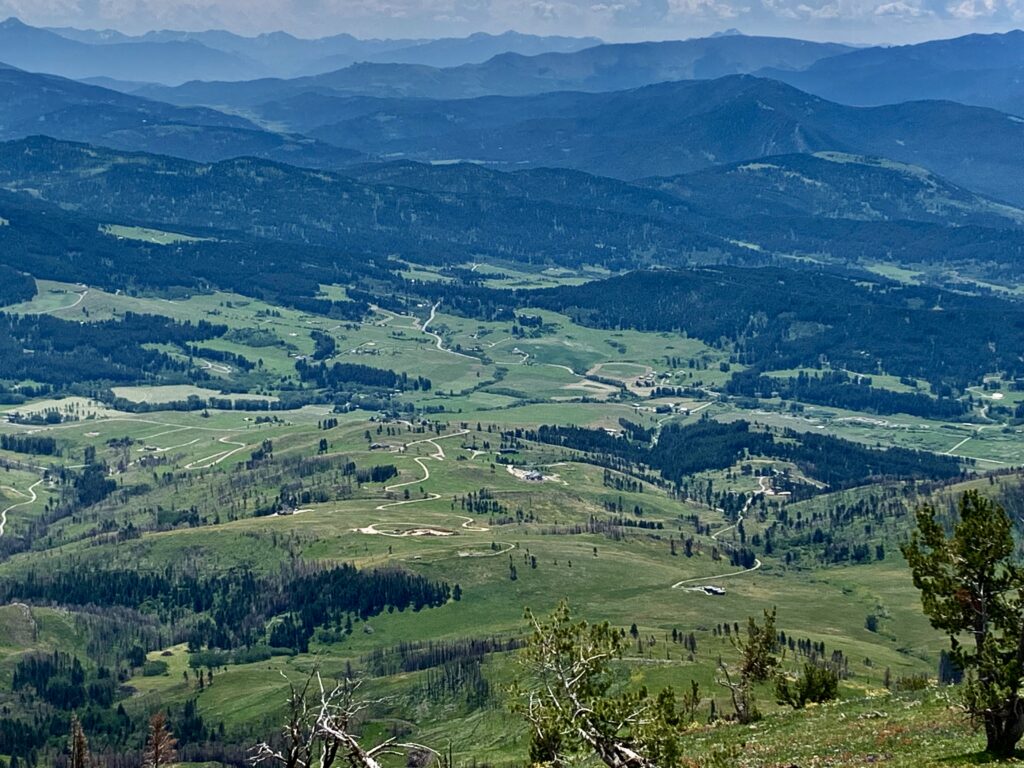EDITOR’S NOTE: One of the most respected organizations in the US devoted to advancing professional wildlife management based on science and sound policy, has written a letter to Wyoming Governor Mark Gordon in the wake of a recent controversial wolf killing incident allegedly involving a man who drove over the animal with a snowmobile.
The Wildlife Society sent the letter to the governor and Brian Nesvik, director of the Wyoming Game and Fish Department, and colleagues, saying the state needs to reform laws that allow what is perceived to be unethical and inhumane behavior in the targeting of wolves and coyotes. The letter, which appears below, was signed by more than two professional wildlife managers and biologists, including several of the organization’s former presidents.
The letter comes at a time when officials in Wyoming government stand accused by conservationists of trying to justify laws—or the lack of them—that allow wolves and coyotes to chased down and killed by snowmobilers in obvious violations of fair chase practices. Its exceedingly rare that leadership in The Wildlife Society would pen such a missive.
To read more about the incident that has ignited fury from wildlife advocates around the world, click on this recent Yellowstonian investigative report. Meantime, read The Wildlife Society letter below.
Letter from Past Presidents of The Wildlife Society
Governor Mark Gordon
State Capitol
200 West 24th Street
Cheyenne, WY 82002
Dear Governor Gordon,
The Wildlife Society, the professional scientific organization representing wildlife professionals, condemns in the strongest possible terms the recent episode where the physical disabling of an individual wolf in the most inhumane fashion occurred near Daniel, Wyoming. The long delay in killing this injured wolf in order to callously display and photograph it while still alive outraged us. We urge swift remedy of the lack of statutory language (laws) that renders the pursuit and running over of a wolf with a snowmachine legal in Wyoming.
It is the position of The Wildlife Society that when humans use wildlife, that use must be consistent with ecological principles as well as an appropriate human activity. One of the pillars of the North American Model of Wildlife Conservation is that wildlife should only be killed for legitimate purposes. In this instance, a wolf was killed for frivolous purpose in a manner that, in our view, could never be considered an appropriate human activity.
One of the pillars of the North American Model of Wildlife Conservation is that wildlife should only be killed for legitimate purposes. In this instance, a wolf was killed for frivolous purpose in a manner that, in our view, could never be considered an appropriate human activity.
It is also the position of The Wildlife Society that hunting, when properly regulated following biological principles, is an appropriate means of managing some wildlife populations. There is no definition that we are aware of that would enable or condone what happened in Wyoming as hunting or identify the individual involved in this incident as a hunter. According to the Boone and Crockett Club, “fair chase is what separates hunting from simply killing or shooting. It demands restraint and self-reliance, aligns with North American wildlife laws, and is in service to conservation.”
Every ethical hunter knows and every hunter education student is taught that one of their primary responsibilities is to take an animal quickly and humanely in order to minimize suffering. In this instance hunting was not involved, only inhumane handling, unnecessary suffering, and delayed killing.
Governor Gordon, the undersigned current and Past Presidents of The Wildlife Society have a combined total of nearly 1,100 years of experience researching and managing wildlife and their habitat worldwide. Our experience was gained at state wildlife agencies, including Wyoming’s, federal service, universities, and private businesses. We urge you to work with the legislature to fix the statutory gap identified in this incident that has tarnished the reputation of Wyoming worldwide. I am available if you would like to discuss our views on this topic further. Thank you.
Sincerely,
Robert P. Lanka, MSc., Certified Wildlife Biologist
78th and current President, The Wildlife Society (2023-2024)
41 years experience
and joined by:
°°°°
Rick Baydack, Ph.D., Certified Wildlife Biologist
69th President, The Wildlife Society (2014-2015)
43 years experience
°°°°
Len Carpenter, Ph.D., Certified Wildlife Biologist
55th President, The Wildlife Society (2000-2001)
30 years experience
°°°°
L. Chambers, Ph.D.
75th President, The Wildlife Society (2020-2021)
45 years experience
°°°°
Daniel J. Decker, Ph.D., Certified Wildlife Biologist
58th President, The Wildlife Society (2003-2004)
50 years experience
°°°°
Thomas Franklin, MSc., Certified Wildlife Biologist
63rd President, The Wildlife Society (2008-2009)
46 years experience
°°°°
Eric Fritzell, Ph.D., Certified Wildlife Biologist
49th President, The Wildlife Society (1994-1995)
50 years experience
°°°°
Diana Hallett, MSc., Certified Wildlife Biologist
56th President, The Wildlife Society (2001-2002)
30 years experience
°°°°
Jonathan Haufler, Ph.D., Certified Wildlife Biologist
68th President, The Wildlife Society (2013-2014)
50 years experience
°°°°
Winifred B. Kessler, Ph.D., Certified Wildlife Biologist
67th President, The Wildlife Society (2012-2013)
51 years experience
°°°°
Paul Krausman, Ph.D., Certified Wildlife Biologist
66th President, The Wildlife Society (2011-2012)
56 years experience including 5 years with wolves
°°°°
Richard Lancia,
59th President, The Wildlife Society (2004-2005)
Many years experience
°°°°
John E. McDonald, Jr., Ph.D.
72nd President, The Wildlife Society, 2017-2018,
35 years experience
°°°°
E. Charles Meslow, Ph.D., Certified Wildlife Biologist
43rd President, The Wildlife Society (1984-1986)
40 years experience
°°°°
Darren Miller, Ph.D., Certified Wildlife Biologist
73rd President, The Wildlife Society (2018-2019)
27 years experience
°°°°
John F .Organ, PhD., Certified Wildlife Biologist
61st President, The Wildlife Society (2006-2007)
47 years experience
°°°°
Gary Potts, MSc., Certified Wildlife Biologist
70th President, The Wildlife Society (2015-2016)
45 years experience
°°°°
Art Rodgers, Ph.D
President-elect, The Wildlife Society
46 years experience including 15 years with wolves
°°°°
Thomas J. Ryder, MSc., Certified Wildlife Biologist
65th President, The Wildlife Society (2010-2011)
46 years experience
°°°°
Rollin D. Sparrowe, Ph.D., Certified Wildlife Biologist
50th President, The Wildlife Society (1995-1996)
60 years service
°°°°
W. Daniel Svedarsky, Ph.D., Certified Wildlife Biologist
62nd President, The Wildlife Society (2007-2008)
55 years experience
°°°°
Bruce C. Thompson, Ph.D., Certified Wildlife Biologist
71st President, The Wildlife Society (2016-2017)
41 years experience including 6 years with wolves
°°°°
W. Alan Wentz, Ph.D., Certified Wildlife Biologist
47th President TWS (1992-1993)
40 years experience
°°°°
Gary White, Ph.D., Certified Wildlife Biologist
74th President, The Wildlife Society (2019-2020)
49 years experience
°°°°
Don Yasuda, B.S., Certified Wildlife Biologist
77th President, The Wildlife Society (2022-2023)
36 years experience
°°°°
Besides Wyoming Governor Gordon, four other Wyoming wildlife officials were copied on the letter:
Drew Perkins, Chief of Staff
Randall Luthi, Policy Director
Sara DiRienzo, Transportation, Wildlife, Gaming and Workforce Policy Staff
Brian Nesvik, Director, Wyoming Game and Fish Department
The Wildlife Society and its network of affiliated chapters and sections represent more than 15,000 professional wildlife biologists, managers, educators, and students dedicated to excellence in wildlife stewardship through science and education. Our mission is to inspire, empower, and enable wildlife professionals to sustain wildlife populations and habitat through science-based management and conservation. To learn about The Wildlife Society’s position on Wolf Restoration and Management in the Contiguous United States please click here.
Subscribe
Never miss a story, subscribe to our newsletter!







